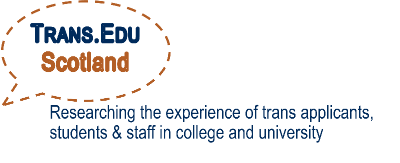TransEDU Research
On this page, you will find information about the TransEdu Scotland research that provided the empirical evidence to develop the resources and information across the TransEDU website.
Click here to view the full TransEdu Scotland Report

Using the menu on the left, you can read the Case Studies collected during the research, and the recommendations made by the TransEDU Scotland report.
About the TransEdu Scotland research
The TransEdu Scotland research examined the experiences of, and current provision for, trans and gender diverse applicants, students and staff in Further and Higher Education across Scotland. The research was funded by the Scottish Funding Council, and was conducted by Dr Stephanie Mckendry and Dr Matson Lawrence at the University of Strathclyde in 2016-17. The purpose of this research was to provide empirical evidence to inform the fulfilment of institutional statutory and ethical obligations, and to build an evidence base to underpin institutional Gender Action Plans, Equality Impact Assessments, Athena SWAN applications, and safeguarding strategies.
The project was initially instigated in response to a lack of empirical evidence on trans and gender diverse experiences in the college and university sectors in Scotland. This lack of evidence presented a challenge to those responsible for developing and implementing policies, practices and guidance for trans equality and inclusion in Scottish institutions. University of Strathclyde colleagues Dr Stephanie Mckendry (Widening Access Manager) and Naseem Anwar (Equality and Diversity Manager) secured funding from the Scottish Funding Council, and then employed Dr Matson Lawrence as the project Research Associate.
Research Questions
1. What barriers are faced by trans applicants, students and staff in the Scottish FE and HE sectors? 2. What are the support needs of trans applicants, students and staff in Scottish FE and HE institutions? 3. What monitoring practices, guidance and support protocols pertaining to trans people do Scottish FE and HE institutions currently have in place?
Definitions
Trans is an umbrella term used to denote people whose gender identity differs from the gender and sex they were assigned at birth. This can include (trans) women, (trans) men, and non-binary and other gender diverse people. Trans people may make, or have made, social and / or physical changes to more closely align to their gender identity. The term gender diverse can denote people who experience their gender identity as outside of the binary of man and woman, including non-binary, genderqueer, agender, and dual role people. We use this term in addition to ‘trans’ because not all those who have diverse gender identities use ‘trans’ to describe themselves. This term is also useful for those who are questioning or unsure about their gender identity.
Trans and gender diverse people are protected under the Equality Act 2010, currently through the protected characteristic of ‘gender reassignment’. The Act proscribes both direct and indirect discrimination on the basis of a person’s trans status, including in education, employment, housing, and the provision of services.
Methodology
The project utilised an action research methodology to allow for an iterative and responsive research strategy, as well as the production of highly practical research outputs. In addition to being methodologically eclectic, action research is reflective and applied, involving an ongoing cyclical process of planning, acting, observing and reflecting (Coghlan & Brannick, 2009). As a methodology it is has been utilised effectively in researching and enhancing student support within higher education (Hodgson et al, 2008; Mckendry, 2012).
The project had three distinct strands:
1. Empirical research investigating the experiences of trans and gender diverse applicants, students and staff. This consisted of an online survey for completion by self-identified trans and gender diverse people who were prospective, current and recent applicants, students and staff at colleges and universities in Scotland. The survey was promoted through social media, via institutions, Students’ Associations and staff networks, and through relevant third sector organisations. Follow-up in-depth, semi-structured qualitative interviews were conducted with all individuals who expressed an interest.
2. Documentary analysis and mapping of current practice within Scottish HEIs and colleges. This consisted of questionnaires, interviews and engagement events with Equality and Diversity and related staff from across the sector, to inform wider understanding of the current policy field, alongside the collection of best practice case studies.
3. Development of practical resources to empower institutions to develop their policies and activities, alongside a peer support Community of Practice. The www.trans.ac.uk website launched in December 2017 and hosts open access, reusable resources to support institutions in developing provision and meeting the research recommendations. See pages 21-22 of the report for full details of dissemination events and activities during the course of the project.